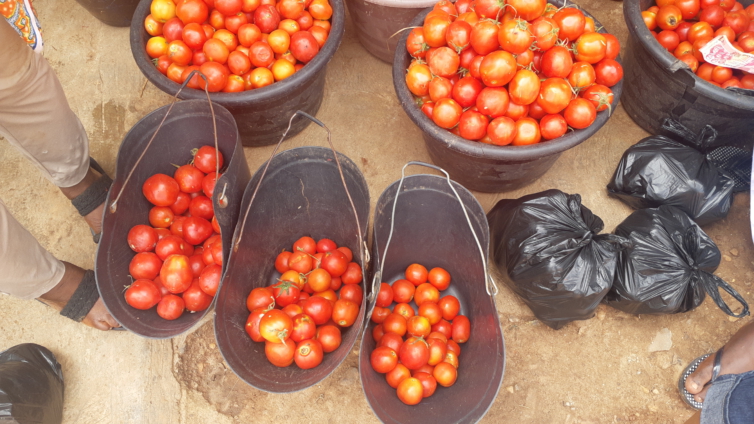Google Trends show demand for Vitamin C supplement has soared in the wake of the Covid-19 pandemic leading to increased global sales.
Information fast spreading on both traditional and social media suggests the supplement wards off Covid-19.
My friend, Sara had no option but to crave for it one early morning.
“Do you have Vitamin C?” Sara texted me through the instant messaging platform, WhatsApp, at exactly 6:15 a.m. on March, 24. “My mother has some conditions, and I’m afraid, it puts her at greater risk of contracting the coronavirus.”

Sara, a resident of Kronum in the Ashanti Region, had for about 2 hours, earlier, combed the enclave for a tablet of vitamin C, but to no avail.
Ghana had recorded her second Covid-19 death victim, an octogenarian, the previous day; I knew her urgency was warranted. Her 64-year-old mother has been battling a heart disease for some time now.
I quickly placed a call to a pharmacist friend, Nii, who wouldn’t give me high hopes regarding how much I was willing to pay for the supplement.
“The strip of Citro-C is GHS2 but we have a powerful one which is GHS25 for 20 effervescing tablets. A tablet contains 1000mg of vitamin C, with Zinc, but I’m not sure we have the GHS2 one in stock; they’ve all be bought. It’s left with only the ones that cost GHS25,” he clarified.
I was curious, because I had already purchased a strip for GHS1 the previous month. The price has shot up. So I arranged a meeting with Amponsah-Efah Pharmaceuticals, producers of Citro-C.
Marketing Manager, Dzifa Amestimey, explained the price hike is not from the company.
“At the moment, Citro-C sells for GHS30 and there are 25 strips and that come down to 1.20 p or at most 1.50p per strip. We’ve not increased prices,’’ he pointed out.
Although the nostalgic sour taste of the orange tablet is yet to vacate my tongue, I wouldn’t like to frequent the pharmacy for the newly-touted Covid-19 shield.
But what if the beliefs of Sara and others are supported by evidence?
Vitamin C, as a potent antioxidant, has long been known. It helps in neutralizing damaging effects of chemicals generated in the body known as free radicals.
Apart from its role in wound healing, several studies have shown Vitamin C lowers risk of heart diseases and chronic diseases.
Nobel laureate, Dr. Linus Pauling’s 1993 claim of large doses of Vitamin C aiding in thwarting common cold was later found to be only marginal.
A 2013 large-scale study involving 11,000 participants showed taking the supplement was beneficial to active people, reducing incidence of cold by half. However, for the general population, it did not reduce cold risk.
"The recommended dietary allowance (RDA) for Vitamin C per day for a normal male adult is 90 mg and for the female is about 75mg. Like other water-soluble vitamins, vitamin C is not stored in the body and so daily intake to meet the RDA is required," explained by a nutritional scientist, Dr Reginald Annan, of the Kwame Nkrumah University of Science and Technology.
“It’s known that if you eat 2 oranges per day, you can meet your vitamin C requirement, as one orange will provide close to 70 mg of vitamin C,” said Dr Annan.
According to the 2019 Annals of Intensive Care, Vitamin C was found to reduce the duration of stay in the intensive care unit and need for mechanical ventilation.
“Also among people suffering from Covid-19, it’s exceptionally large doses of vitamin C given as IV that was found to be helpful and these were given in severe cases that required hospitalization,” according to Dr Annan.
On March 28 and 29, when speculation of total lockdown became prominent, Kumasi Shopping Malls and Melcom Shops were agog with patrons in panic-buying.

“We baked 3,000 loaves today,” a baker at Shoprite told me. "By 7, all had finished.”
Similar situation happened at market centres like Afia Kobi, Kumasi Central and Asafo. Food items such as gari, yam, oil, rice and plantain, demand was high, and prices were almost hitting the roof.
Though many people wouldn’t mind buying a kilo of gari for 30 cedis for an American Tin or ‘olonka’ which ordinarily should sell at 20 cedis, others like Nkum, were outraged.
“I went to the Central Market to buy a tuber of yam; see this tuber,” he posted on his Facebook page in apparent rage. “I would’ve normally bought this for 10 cedis but see, it’s now 20 cedis. How can we do this to ourselves?”
Rise in non-communicable diseases
A 2010 report in the Journal of Urban Health says the “major causes of death in Ghana have shifted from predominantly communicable diseases to a combination of communicable and chronic non-communicable diseases over the last few decades.”
It notes, hypertension, stroke, diabetes and cancers have become top 10 causes of death.
Apart from urbanization, an ageing population, globalization and weak healthcare systems, the World Health Organization (WHO) fingers change in lifestyle, including poor diets, as major factors.
A study which was part of a project dubbed, Researching into Obesogenic Urban Food Environment, its Drivers and Potential Levers in South Africa and Ghana, found a number of Ghanaians patronized unhealthy foods. They include biscuits which are largely patronized by the youth and women.
The trend gives more credence to a 2016 review of nearly 20 years of data on overweight and obesity epidemic in Ghana which found almost 43 per cent of Ghanaian adults are either obese or overweight.
“Per studies publication years, consistent increases in overweight and obesity prevalence were observed in Ghana in the period 1998-2016,” the report stated.
Obesity among school children hasn’t been ruled out in a study churned out by the Journal BMC Public Health. It found 46.9 per cent of children were overweight, 21.2 per cent obese.
The study which involved 5 to 15 years age bracket hinted of frequent consumption of fizzy drinks as a factor.
A newly published study in the Journal BMC Nutrition authored by Dr Annan and his colleagues at KNUST reported 10.5 per cent children attending selected government-owned primary schools in Kumasi were overweight, 14.2 per cent among girls and 4.2 per cent among boys, indicating that the childhood obesity is also becoming a problem in Ghana.
Though, adults might have a sense of exercising during the lockdown, the children’s situation is likely to get worse.
“My children have been eating more, have been eating more sweets behind their laptops and the TV, and they are doing less chores,” Roland Walker, a presenter at Joy News, expressed fears.
Indeed, after touring some of the warehouses around the central business district of Kumasi, I got a fair idea what the citizens are exposed to and expected to consume in the coming years.
Bags of rice, carbonated drinks and sugar were carted in away every minute, every day. Most of them distribute products of more than 6 companies.
“Every day, there’s demand so trucks keep taking products from here. In a matter of 6 months, a very good product should be out of the warehouse,” Samuel Antoh, a warehouse manager said.
When I enquired of anyone who distributes fresh food, none could show me one.
A manager of one of the stores I approached clearly stated the idea had never crossed his mind.
“For now, we don’t have intention of going there because it has its challenges. For fruits, and vegetables, that’ll be big challenge,” Fred Brefo, another warehouse manager, pointed out.
Can the restaurants, therefore, be blamed if 68 per cent of them in the Greater Accra Region decided to serve fast food, as a 2013 study suggests? Can you guess the numbers in 2020?
While the warehouses around Adum wouldn’t shudder hoarding their stocks for several months, just 500 meters walk away, fruit and vegetable sellers at Afia Kobi Market wouldn’t gamble with that.
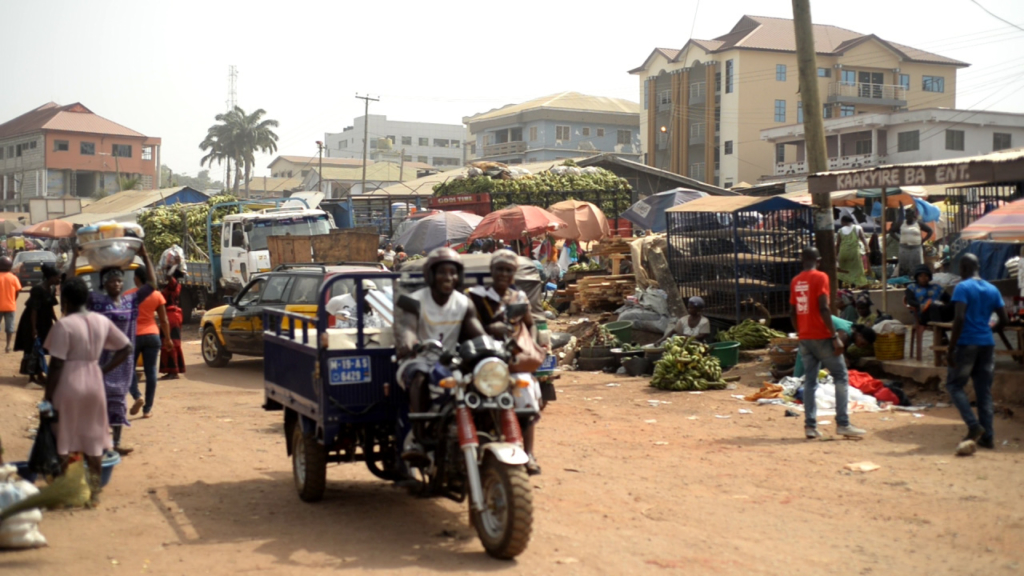
It’s the biggest fruit and vegetable hub in Ghana’s second largest city, Kumasi.
On a Tuesday, in the second week of the lockdown when I visited the place, lots of fruits were on display.
400 grams of fruit and vegetable is recommended per day, a quantity approximately equivalent to 5 servings.
Insufficient intake of fruit and vegetables is estimated to cause around 14 per cent of gastrointestinal cancer deaths, about 11 per cent heart disease deaths and about 9 per cent of stroke deaths.
A survey of 449 polytechnic students showed 63 per cent of respondents didn’t consume fruits 1 to 3 times a day compared to 59 percent who did regularly for vegetables.
Their juniors in the senior High Schools haven’t also fared well, as a 2007 study on dietary practices in Ghana showed most adolescents ate fewer servings of grains, fruits, vegetable and dairy products than the recommended.
It’s therefore not surprising, a Food and Agriculture Organization (FAO) finding 3 years ago had indicated Ghana’s national average consumption of fruits and vegetables is below the WHO’s recommendation.
“The average population still does not consume the minimum daily requirement of 400 g per day of fruit and vegetables necessary for good health,” the report stated.
On the eve of the lockdown, when staples were in high demand, fruit traders told me theirs was business as usual.
“They know the fruits are always available and so they weren’t buying them as much,” orange seller, Asantewaa, observed. But according to Dr Annan, “the cost of fruits and vegetables, and the fact that families have very limited amount to buy food to last the lockdown is a major reason very few looked at the fruits markets in preparation of the lockdown.”
Though the garden eggs and tomatoes had enjoyed the price hike, prices had gone down on the day of the partial lockdown. A box which was sold for 1,000 cedis was now going for 700 cedis.
“They’re perishable and we have them in abundance. If we don’t sell them off, we’ll lose,” Akua Afriyie told me.
Meanwhile, 2 trucks full of fruits had lined up; bound for other regions.
“This one can contain 180 boxes,” Chairman of Fruit Traders Association, Jeff Samuel, said, pointing to a truck containing avocado bound for the Northern Region. “This is the smallest vehicle among the trucks we use for loading. The bigger trucks can accommodate 450 boxes. Every day, we load not less than 4 trucks; so every day we load more than 2,000 boxes.”

The truck containing pineapple, however, was busily being unloaded in a shade.
“A truck contains 1,200 fruits but because of our weather, we put them in the shade so that it will not get spoilt easily. We do that for pineapples and water melons," Jeff explained.
About 20 metres from where Jeff and I stood were pile of discarded water melons.
The fly-feasting waste belongs to Yaa Manu, a seller, with 20 years’ experience.
“The losses are unbearable. Last week I had so much fruit spoiling that I lost 1,000 cedis worth of fruits. Though we try to sell off the ripen ones early, it’s still not easy to stop them from spoiling,” she bemoaned.
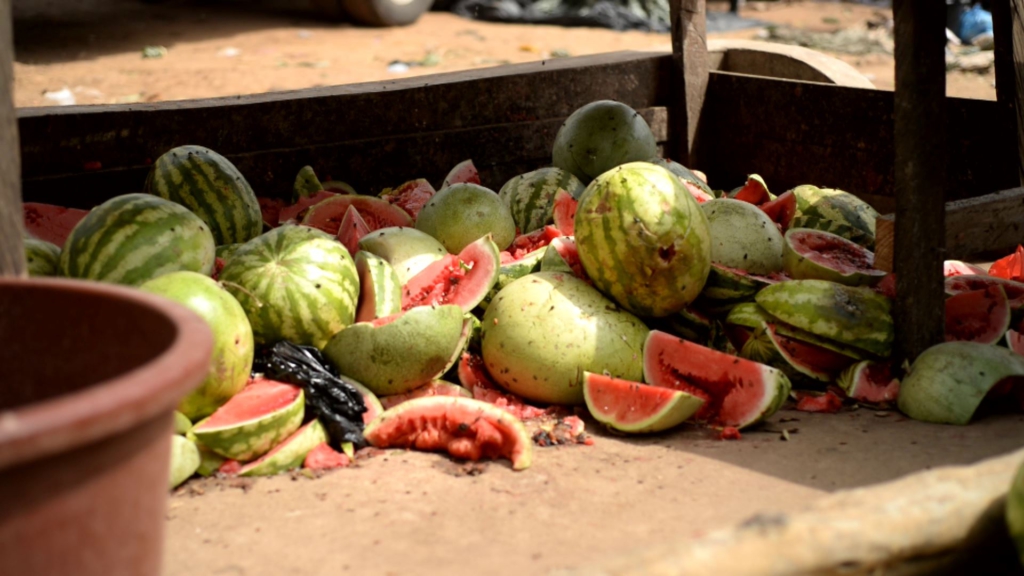
Yaa Manu wasn’t the only one bearing this cross; orange sellers had worse tales to tell. Yaa Agyeiwaa gets her consignment not only from Ashanti but Central and other regions, as well.
She led me to the back of their wooden storage where rotten oranges in the 132 kg maize sacks, were on an earth of burnt oranges. I was later told the communal refuse containers were full of the sacks.
“It has been our main source of livelihood but the oranges spoil too much; and it’s because we don’t get enough customers. We even pay to dispose of the waste,” she lamented.
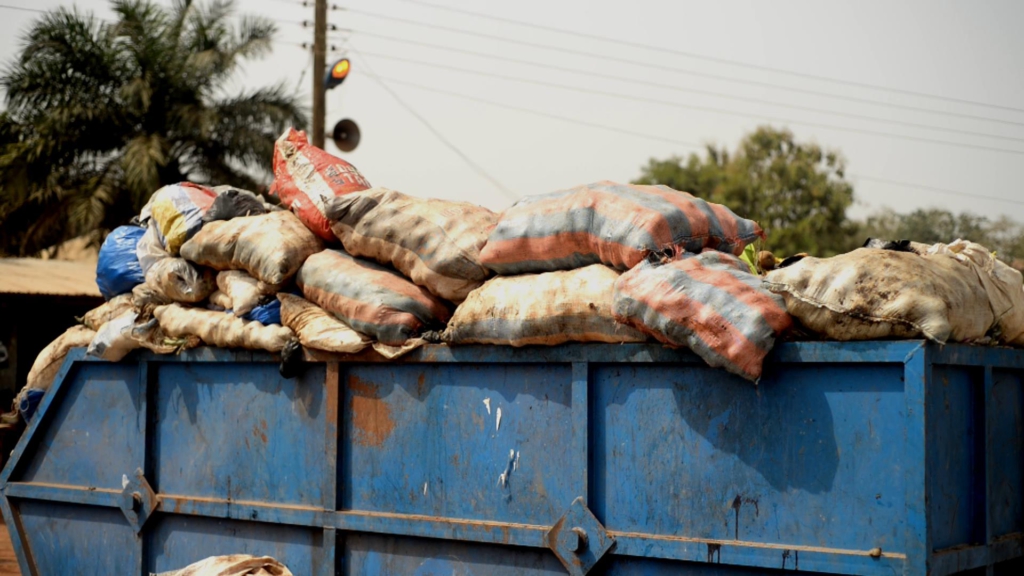
At the opposite end, vegetable sellers were organizing sacks of cabbage and carrot they received the previous day. I counted over 10 sacks filled with cabbage but on the floor were some destined for the bin.
“When we bring them from the farms we put them in the baskets,” market queen, Akosua, revealed. “If we don’t take them out of the sacks, it’ll get spoilt in 3 days.”
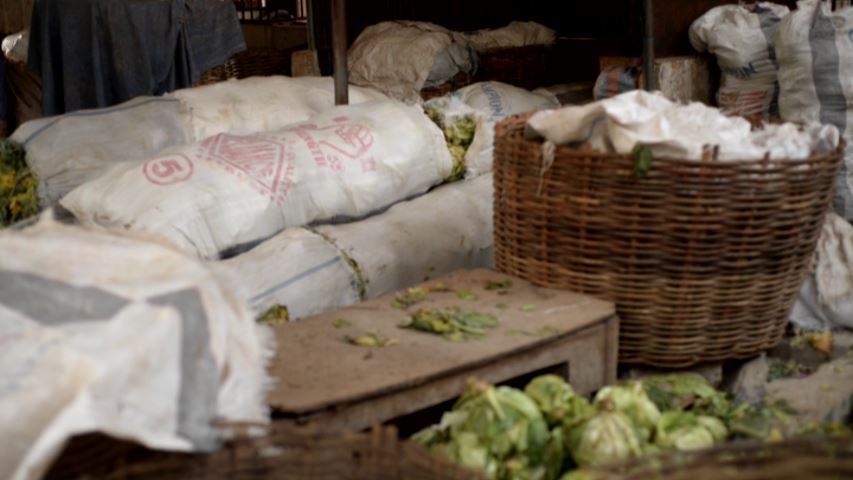
At Ayigya Area, where Akosua’s colleagues sometimes get their consignment, farmer, Ebenezer Ayumadari, uses a can to water his 6-bed cabbage and spring onions every day.
The farmer, who is also a security guard, is grieving not only over some of his pest-infested cabbage but his money locked up with clients.
“Sometimes, they claim they couldn’t make sales or items got spoiled so they can’t pay full amount. Right now, I’m yet to receive a dime of last week’s sales,” he revealed.
Government interventions
According a 2007 FAO food balance sheet, starchy root consumption in Ghana increased from 802 g per person per day in 1992 to 1,035 g per person per day in 2007, growing at an average annual rate of 10.27 per cent.
The same can’t be said of vegetable consumption which was at 93 g per person per day and fruit which stood at 393 g per person per day.
Growth of fruit consumption at an annual rate of 29.42 per cent and vegetables at 12.60 per cent couldn’t, perhaps, influence attention in the government’s Planting Food and Jobs programme.
The programme launched 3 years ago is meant to promote food production and create jobs across the country.
The Food and Agriculture Ministry says the policy has yielded significant results.
Sector Minister, Dr Owusu Afriyie Akoto, says: “maize yield increased from 1.8 metric tonnes per hectare to 3.0 metric tonnes per hectare, representing 67 per cent increase.
"Rice yield increased by 48 per cent from 2.7 metric tonnes per hectare to 4.O metric hectare and soya yield equally increased by 150 per cent from l metric tonnes per hectare to 2.5 metric tonnes per hectare.
“The strategy for targeting crops has been to focus on crops with high potential for food security, import substitution and raw material for industry,” the Minister emphasized.
In 2017, the Ministry focused on maize, rice, sorghum, soyabean and vegetables but in 2018, cassava, orange, sweet potato and groundnuts were targeted.
The gains in 2019 and this year, amid the armyworm invasion, prompted Dr Afriyie Akoto to assuage fears of citizens not to engage in panic- buying on the eve of the partial lockdown against Covid-19.
“There’s more than enough food in the system… there’s no need to stock-up,” he admonished.
The National Food Buffer Stock Chief Executive, Hanan Abdul-Wahab, reiterated the Minister’s claim: "There’s enough food,” in a conversation with Roland Walker on Joy News, AM SHOW.
While these foods are having a good stay at the National Buffer Stocks, what about the fruits and vegetables; where are they being stored?
Nutritional scientist at the Kwame Nkrumah University of Science and Technology, Dr Charles Apprey, believes government’s little attention to fruits and vegetables is to blame for post-harvest losses and high prices.
“Three days ago, I attempted buying water melon, and small one was going for 10 cedis,” he revealed, after speaking with a trader who complained they’re not getting supplies as a result of the lockdown.
“It’s true there’s large stock of staples but how do we supply people with fruits and vegetables?” he questioned.
Hidden hunger
A United Nations Children’s Fund Ghana Micronutrient survey has it that 50 per cent and 66 per cent of pregnant and non-pregnant women; and pre-school children, respectively, suffer from anaemia.
In the same report, it’s stated about 30 per cent of pre-school children also suffer from iron and vitamin A deficiencies.
Micronutrient deficiency is the lack of essential vitamins and minerals required by the body in small amounts for proper growth and development.
Micronutrients play a central role in proper working of the body tissue function.
Dr Apprey observes rush for staples without complimenting them with fruits and vegetables results in hidden hunger.
“Most of these foods people are rushing to buy are rice-based foods. There’s nothing wrong with these foods but when you eat a lot of rice without fruits and vegetables, you’re full in your stomach but then there’s a hidden hunger,” he pointed out.
“The fruits and vegetables that give you the micronutrients is what are going to boost your immune system to fight Covid-19,” Dr Apprey advised.
President Akufo-Addo, in his 5th national address on interventions against Covid-19 in the midst of the lockdown, pledged to provide 400,000 poor and vulnerable people free food.
Two days after the address, I followed the Ashanti Regional Minister, Simon Osei-Mensah, to supervise distribution of about 100,000 worth of food items to needy persons.
It included rice, gari, sugar oil and canned sardines.
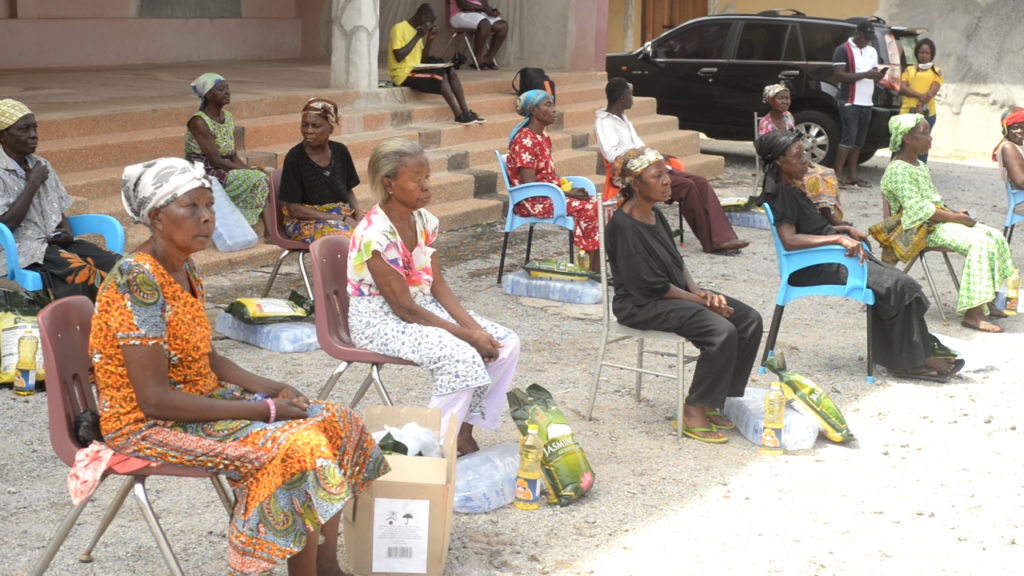
This initiative is replicated in other areas of the country, with support from religious organizations and corporate institutions but Dr Apprey says it’s not enough.
“Without vitamins and minerals, the body cannot utilize the carbohydrate and proteins. We say people are hungry, we’re sharing food for them and we go around giving them carbohydrates. Carbohydrate will make you full but you’re prone. It’ll make you obese and this can make you diabetic and we know the diabetic and those with hypertension are at risk,” he cautioned.
“We need fruits and vegetables to boost the immune system of the people,” Dr Apprey advocated.
Dr. Annan adds: “Supplements aren’t recommended for a normal adult. Common pepper and oranges are good sources of vitamin C. A family that adds fruits and vegetables will be made up of people who are stronger, especially, the fat soluble vitamins which you can store. So it’s not this time you’re looking to boost your immune system.”
Post Covid-19
Ghana’s fruit and vegetable market is expected to grow at 5.3 per cent from this year to 2025.
Blue Skies, Peelco and Pinora, among others, are processing these fruits to prevent post-harvest losses and make them available all year round. Springing up of many fruit juice and smoothie joints has made it possible for many to have access to fruits and vegetables. They are however not cheap: a 600-litre bottle of orange juice goes, at least, for 5 cedis. Those who prefer the smoothie will have to part with 6 cedis or 7 cedis.
Findings from the Researching the Obesogenic Food Environment (ROFE), a project between Ghana and South Africa, which is exploring drivers of the food environment and possible policy to improve the food environment has reported huge losses of fruits and vegetables and called for urgent policies to stop these losses.
Dr Reginald Annan, also the Principal Investigator of the ROFE Ghana team, believes: “Policies must be in place to make fruits and vegetable available all year round, so that the poor person can access balanced diet which include fruits and vegetables.”

Fruit Traders Association Chairman, Jeff Samuel, is worried lack of proper regulation and financial assistance are hampering fruit availability.
“We need government’s intervention. When our people produce the fruits and vegetables there are not enough buyers and they all get spoilt, because of lack of regulations. Getting soft loans is a big problem,” he complained.
Dr Apprey, also a ROFE team member, wants Ghana to emulate the South African example by building cold storage facilities for fruits and vegetables.
“Assuming no one goes to the farm for one month, what will happen to fruit and vegetable availability, if not from your backyard?” he quizzed.
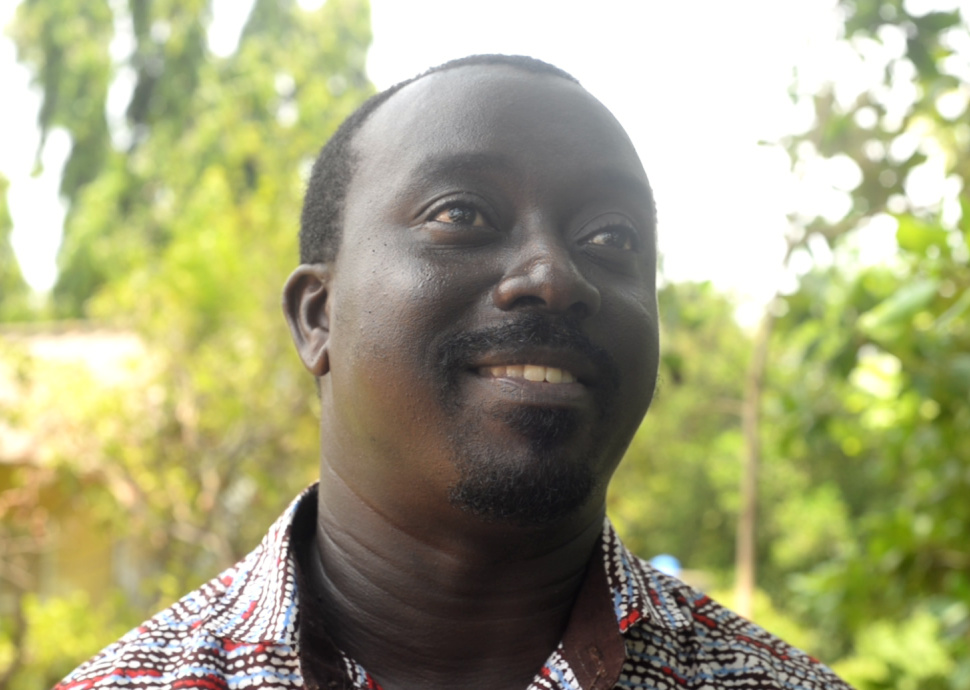
Fruits and vegetable intake is first on UNICEF’s healthy eating tips recommendation for Covid-19. WHO recommends a well-balanced diet to build a strong immune system.
Ghana is fortunate enough with bountiful sunlight to help provide the citizenry with vitamin D.
However, other micronutrients, Zinc, for instance, have long been known to be crucial in helping the body fight viruses and stay healthy.
Government’s nutritional policy interventions will thus be consummated with a policy that will ensure Ghanaians are supplied with foods protective enough during and after Covid-19.
Latest Stories
-
IPR Ghana congratulates citizens for peaceful election, calls for unity
28 minutes -
Bawumia’s 8 minutes elite ball that zapped the energy of trigger happy politicians
1 hour -
It will be a betrayal if National Cathedral saga does not feature in ORAL’s work – Ablakwa
1 hour -
‘It’s unfortunate we had to protect the public purse from Akufo-Addo’ – Ablakwa on ORAL Team’s mission
2 hours -
Congo lawyers say Apple’s supply chain statement must be verified
3 hours -
Stampede in southwestern Nigerian city causes multiple deaths
3 hours -
Tens of thousands without water in Mayotte as curfew brought in
3 hours -
ORAL: We won’t witch-hunt, we’ll focus on transparency, not revenge – Ablakwa
4 hours -
Attempted robbery: Accused claims he carried cutlass for protection
4 hours -
Excavator operator jailed for stealing
4 hours -
African fans age-shame me for putting on some outfits – Tiwa Savage
4 hours -
Tiwa Savage criticised by female fans for stance on cheating in relationships
4 hours -
Bank of England expected to hold interest rates
5 hours -
Congo river boat sinks killing at least 22
5 hours -
Nigeria approves Shell’s $2.4 billion asset sale to Renaissance
5 hours

